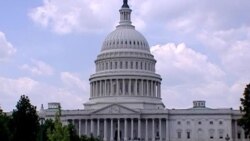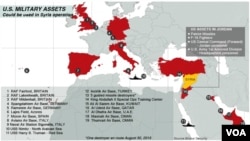CAPITOL HILL —
President Barack Obama is facing increasing resistance to a potential military strike against Syria - both among U.S. allies abroad and at home from skeptical members of the U.S. Congress. And a new NBC poll indicates that 79 percent of Americans think the president should seek congressional approval before ordering any strikes against Damascus. Debate is simmering over U.S. involvement in another Middle East conflict.
Britain’s House of Commons destroyed any hopes Obama may have had for support from a close ally, voting to reject a military strike on Syria.
In Washington, the U.S. Congress is in recess until September 9, so a vote in the coming days is highly unlikely. Republican Congressman Scott Rigell is leading efforts for Congress to have a say with a bipartisan letter to the president signed by close to 140 lawmakers.
“He does need to call us into a joint session, make the case before the American people, allow us a reasonable amount of time to deliberate the matter and then to issue specific statutory authority prior to the use of force," said Rigell.
Top officials have briefed key members of Congress, and the president phoned House Speaker John Boehner. Rigell said consultations alone are not enough.
“Even the discussions he [President Obama] is having with senior leadership of the House and the Senate, that is also a good thing, but that, too, is not a substitute for engaging the institution itself, Congress, as a separate and equal branch of government,” said Rigell.
Analysts say there are many precedents for presidents to act without Congress, most recently in Libya.
Wells Bennett of the Brookings Institution said, “But in a case like this, where there is no clear threat to say, U.S. interests, or U.S. people, it is a little more difficult to fit a unilateral presidential action in Syria in the line with some of those past other historical episodes where presidents have acted alone.”
Opponents of unilateral action are citing the 1973 War Powers resolution, passed to limit executive power after the Vietnam War.
“The idea is that if the president uses force abroad, deploys the United States Armed Forces into what is called hostilities under the law, that it triggers a time-clock that he has obviously to report on what he has done, but also, after a certain passage of that clock, bring the people back,” said Bennett.
Some lawmakers, such as Republican Senator John McCain, agree with the president that action must be taken - in response to alleged chemical attacks by the Syrian government.
For those who demand a voice for Congress, their only recourse may be a later vote to defund any potential military operations in Syria.
Britain’s House of Commons destroyed any hopes Obama may have had for support from a close ally, voting to reject a military strike on Syria.
In Washington, the U.S. Congress is in recess until September 9, so a vote in the coming days is highly unlikely. Republican Congressman Scott Rigell is leading efforts for Congress to have a say with a bipartisan letter to the president signed by close to 140 lawmakers.
“He does need to call us into a joint session, make the case before the American people, allow us a reasonable amount of time to deliberate the matter and then to issue specific statutory authority prior to the use of force," said Rigell.
Top officials have briefed key members of Congress, and the president phoned House Speaker John Boehner. Rigell said consultations alone are not enough.
“Even the discussions he [President Obama] is having with senior leadership of the House and the Senate, that is also a good thing, but that, too, is not a substitute for engaging the institution itself, Congress, as a separate and equal branch of government,” said Rigell.
Analysts say there are many precedents for presidents to act without Congress, most recently in Libya.
Wells Bennett of the Brookings Institution said, “But in a case like this, where there is no clear threat to say, U.S. interests, or U.S. people, it is a little more difficult to fit a unilateral presidential action in Syria in the line with some of those past other historical episodes where presidents have acted alone.”
Opponents of unilateral action are citing the 1973 War Powers resolution, passed to limit executive power after the Vietnam War.
“The idea is that if the president uses force abroad, deploys the United States Armed Forces into what is called hostilities under the law, that it triggers a time-clock that he has obviously to report on what he has done, but also, after a certain passage of that clock, bring the people back,” said Bennett.
Some lawmakers, such as Republican Senator John McCain, agree with the president that action must be taken - in response to alleged chemical attacks by the Syrian government.
For those who demand a voice for Congress, their only recourse may be a later vote to defund any potential military operations in Syria.
















